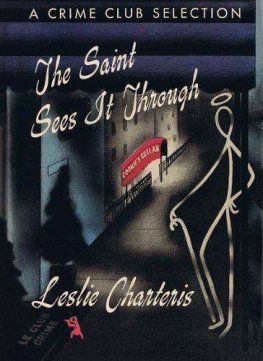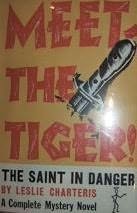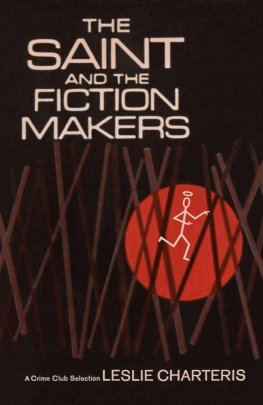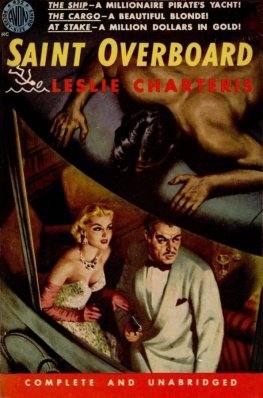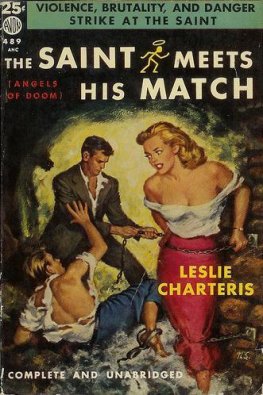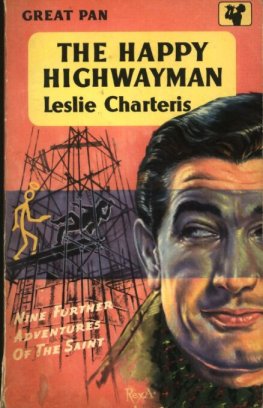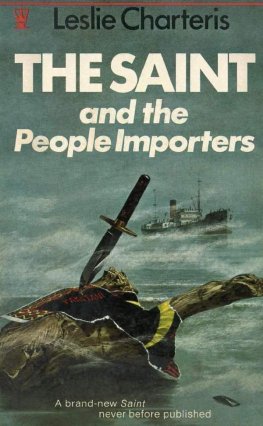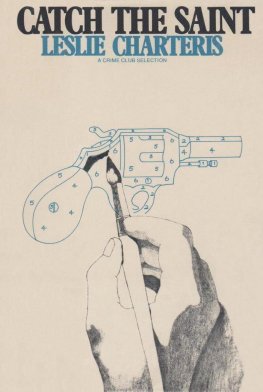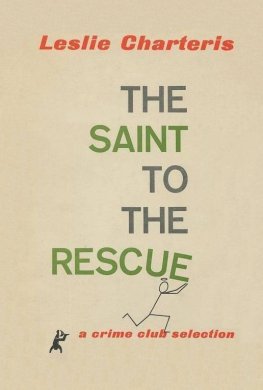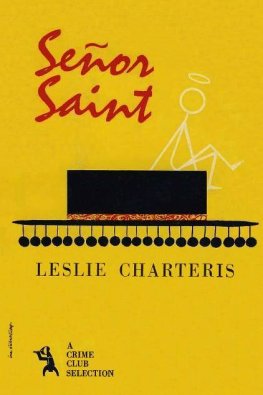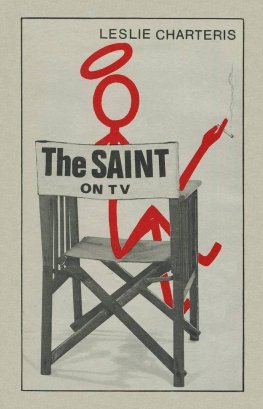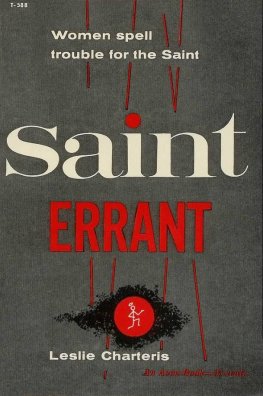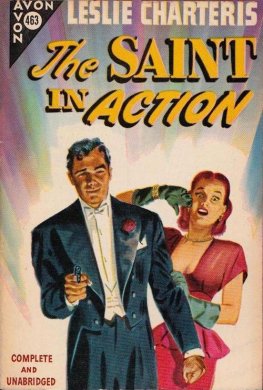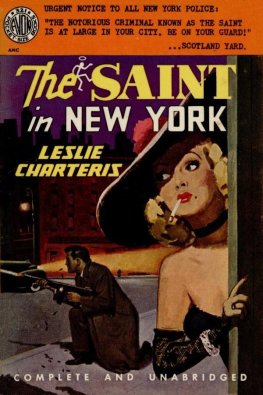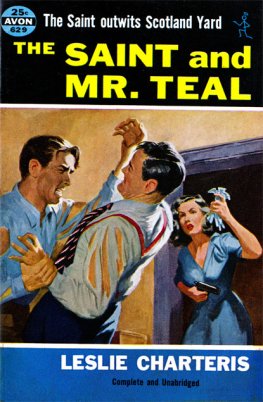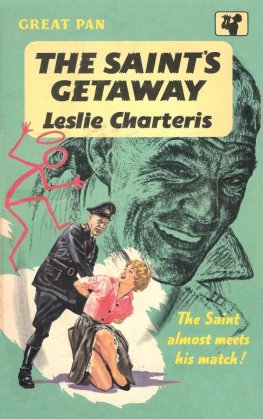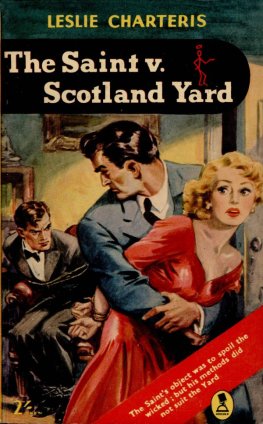Leslie Charteris
The Saint Sees it Through
Simon Templar ("The Saint")
Deadly foe of the "Ungodly." His code is harsh but just and applies to all criminals whether they be men or women!
Avalon Dexter
Has so perfect a figure that she can wear anything or nothing with equal grace. Is she for the Saint? Or is she allied with a vicious, world-wide gang of criminals? The Saint is not sure.
Dr. Ernst Zellermann
Tall, silky-haired, Park Avenue psychiatrist. Has"... one of those fat smiles that somehow remind the Saint of fresh shrimps." An habitue of Cookie's Cellar.
Cookie
A mammoth woman. Proprietress of "Cookie's Cellar" and "Cookie's Canteen." "Everybody's back-slapper and good egg, with a heart of garbage and scrap iron!"
Ferdinand Pairfield
Golden-haired surrealistic artist who works for Cookie. "He" paints his fingernails with a violet tinted lacquer.
Kay Natello
Slatternly writer of lewd lyrics that Cookie sings. Has a "voice like a nutmeg grater on tin cans..."
Patrick Hogan
A simple seaman who is"... painting the town with a roscoe in his pants." Knocks the Saint cold with a single smashing blow to the jaw!
1. How Simon Templar spent a night out,
and Avalon Dexter took him home
Simon Templar lighted another cigarette, took a sip of his latest and most anemic-looking highball, and reflected with considerable gloom that if the vanquishing of villains required any man like himself to endure certain unpleasantnesses and discomforts there must be a lot of more attractive and entertaining places to endure them in than a joint with a name like Cookie's Cellar, situated in a rejuvenated basement in the East Fifties of New York City, USA.
Such, for instance, as any reasonably busy boiler factory in any moderately insalubrious zone of reconversion.
For instance, in the boiler factory he would not have been offered Little Neck clams to whet his appetite. But then, after succumbing to the temptation, he would not have been faced with a soup plate full of water enlivened with a few fragments of weary ice among which floated, half submerged, four immature bivalves which had long ago decided that the struggle for existence was not worth it. In the boiler factory, he would not have been able to order a rare filet mignon; but then, he would probably have had a real appreciation of the lunch in his plastic pail.
In the boiler factory there might have been a continual cacophony of loud and nerve-racking noises; but it was very doubtful whether they could have achieved such pinnacles of excruciating ingenuity as were being scaled by the five frenetic sons of rhythm who were blowing and thumping their boogie-woogie beat on the orchestra dais. There might have been smoke and stench in the air; but they would have been relatively crisp and fresh compared with the peculiarly flat sickly staleness of the vaporized distillate of cigars, perfume, and sweat that flowed through the happy lungs of Cookie's clientele.
There might have been plenty of undecorative and even vicious men to look at; but they would not have been undecorative and vicious in the sleek snide soft way of the chair-polishing champions who had discovered that only suckers work. There might have been a notable dearth of beautiful women who wore too little, drank too much, and chattered too shrilly; and it would have been a damn good thing.
But Simon Templar, who was known as the Saint in sundry interesting records, sat there with the patience of a much more conventional sanctity, seeming completely untouched by the idea that a no-girl no-champagne customer taking up a strategic table all by himself in that jam-packed bedlam might not be the management's conception of a heaven-sent ghost...
"Will there be anything else, sir?" asked a melancholy waiter suggestively; and the Saint stretched his long elegantly tailored legs as best he could in the few square inches allotted to him.
"No," he said. "But leave me your address, and if there is I'll write you a postcard."
The melancholy one flashed him a dark glance which suggested that his probable Sicilian ancestry was tempted to answer for him. But the same glance took in the supple width of the Saint's shoulders, and the rakish fighting lines of a face that was quite differently handsome from other good-looking faces that had sometimes strayed into Cookie's Cellar, and the hopeful mockery of translucent blue eyes which had a disconcerting air of being actively interested in trouble as a fine art; and for some reason he changed his mind. Whereby he revealed himself as the possessor of a sound instinct of self-preservation, if nothing else.
For those rather pleasantly piratical features had probably drifted in and out of more major forms of trouble than those of any other adventurer of this century. Newspaper reproductions of them had looked out from under headlines that would have been dismissed as a pulp writer's fantasy before the man whom they accoladed as the Robin Hood of modern crime arrived to make them real. Other versions of them could have been found in the police files of five continents, accompanied by stories and suspicions of stories that were no less startling if much more dull in literacy style; the only thing lacking, from the jaundiced viewpoint of Authority, was a record of any captures and convictions. There were certain individual paladins of the Law, notably such as Chief Inspector Claud Eustace Teal, of Scotland Yard, and Inspector John Henry Fernack, of New York's Centre Street, whose pet personal nightmares were haunted by that impudent smile; and there were certain evil men who had thought that their schemes were too clever to be touched by justice who had seen those mocking blue eyes with the laughter chilling out of them, the last thing before they died.
And now so many of those things were only memories, and the Saint had new enemies and other battles to think of, and he sat in Cookie's Cellar with as much right and reason as any law-abiding citizen. Perhaps even with more; for he was lucky enough never to have heard of the place before a man named Hamilton in Washington had mentioned it on the phone some days before.
Which was why Simon was there now with absolutely no intention of succumbing to the campaign of discouragement which had been waged against him by the head waiter, the melancholy waiter, the chef, and the chemist who measured out eyedroppers of cut liquor behind the scenes.
"Are you waiting for somebody, sir?" asked the melancholy waiter, obtruding himself again with a new variation on his primary motif; and the Saint nodded.
"I'm waiting for Cookie. When does she do her stuff?"
"It ain't hardly ever the same twice," said the man sadly. "Sometimes it's earlier and sometimes it's later, if you know what I mean."
"I catch the drift," said the Saint kindly.
The orchestra finally blew and banged itself to a standstill, and its component entities mopped their brows and began to dwindle away through a rear exit. The relief of relative quiet was something like the end of a barrage.
At the entrance across the room Simon could see a party of salesmen and their lighter moments expostulating with the head waiter, who was shrugging all the way down to his outspread hands with the unmistakable gesture of all head waiters who are trying to explain to an obtuse audience that when there is simply no room for any more tables there is simply no room for any more tables.
The melancholy waiter did not miss it either.
"Would you like your check, sir?" he inquired.
He put it down on the table to ease the decision.
Simon shook his head blandly.
"Not," he said firmly, "until I've heard Cookie. How could I look my friends in the eye if I went home before that? Could I stand up in front of the Kiwanis Club in Terre Haute and confess that I'd been to New York, and been to Cookie's Cellar, and never heard her sing? Could I face"

